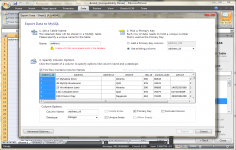 MySQL 5.5.19
MySQL 5.5.19
MySQL AB - (Open Source)
MySQL is a successful open source database used in most web applications, e-commerce and online transaction processing.
MySQL is one of the world's most famous and used open source database. The software can be used to manage web applications, e-commerce and online transaction processing since MySQL database incorporates support those transactions. It is also commonly associated with PHP when it comes to managing websites.
With standard JDBC , ODBC, and Net, the developer can choose the programming language. MySQL has the advantage of working with almost all the popular operating systems and communicate easily with programming languages ​​such as C, C + +, VB, C #, PHP, Python, Ruby, Java, Perl, Eiffel, etc.MySQL replication allows you to create profitable applications. In addition, it enables the development of typologies replication complex and massive chain.Its reliability and robustness, performance, ease of use makes MySQL have more success than anticipated.
- Title:
- MySQL 5.5.19
- File Size:
- 31.1 MB
- Requirements:
- Windows 9x / 2000 / XP / Vista / Windows7 / Windows8
- Language:
- en-us
- License:
- Open Source
- Date Added:
- 08 Dec 2011
- Publisher:
- MySQL AB
- Homepage:
- http://www.mysql.com
- MD5 Checksum:
- D5605E9A56202569FAF9AB3797C0C519
# Bugs Fixed
* InnoDB Storage Engine: An incorrect deadlock could occur on a server doing a substantial amount of change buffering for DML operations, particularly DELETE statements.
* Rounding DBL_MAX returned DBL_MAX, not 'inf'.
* mysql_upgrade did not upgrade the system tables or create the mysql_upgrade_info file when run with the --write-binlog or --skip-write-binlog option.
* If a plugin was uninstalled, thread local variables for plugin variables of string type with wth PLUGIN_VAR_MEMALLOC flag were not freed.
* Deadlock could occur when these four things happened at the same time: 1) An old dump thread was waiting for the binary log to grow. 2) The slave server that replicates from the old dump thread tried to reconnect. During reconnection, the new dump thread tried to kill the old dump thread. 3) A KILL statement tried to kill the old dump thread. 4) An INSERT statement caused a binary log rotation.
Related software
4.7/5 from 47 users


